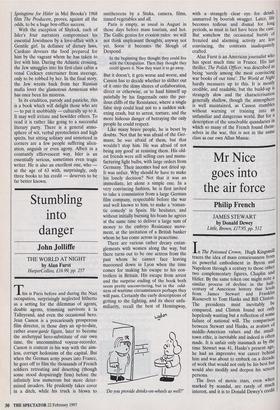Stumbling into danger
John Jolliffe
THE WORLD AT NIGHT This is Paris before and during the Nazi occupation, surprisingly neglected hitherto as a setting for the dilemmas of agents, double agents, trimming survivors A la Talleyrand, and even the occasional hero. Jean Casson is a precariously prosperous film director, in those days an up-to-date, rather avant-garde figure, later to become the archetypal hero-substitute of our own time, the uncommitted voyeur-recorder. Casson is content in his way with the aim- less, corrupt hedonism of the capital. But when the German army pours into France, he goes off to film the thousands of French soldiers retreating and deserting (though some stood despairingly firm) before the infinitely less numerous but more deter- mined invaders. He prudently takes cover in a ditch, while his truck is blown to smithereens by a Stuka, camera, films, tinned vegetables and all.
Paris is empty, as usual in August in those days before mass tourism, and hot. The Gallic genius for evasion rules: we will not think unpleasant thoughts, anyway not yet. Soon it becomes the Slough of Despond.
In the beginning they thought they could live with the Occupation. Then they thought they could ignore it. Now they want it to go away.
But it doesn't, it gets worse and worse, and Casson has to decide whether to slither out of it onto the slimy shores of collaboration, direct or otherwise, or to haul himself up painfully by his fingernails onto the per- ilous cliffs of the Resistance, where a single false step could lead not to a sudden sick- ening crash, but to arrest, torture, and the more hideous danger of betraying the only people he could respect.
Like many brave people, he is beset by doubts. 'Not that he was afraid of the Ger- mans; he was afraid of them, but that wouldn't stop him. He was afraid of not being any good' at resisting them. His old- est friends were still selling cars and manu- facturing light bulbs, with large orders from Germany, Their incomes had not dried up. It was unfair. Why should he have to make his lonely decision? Not that it was an immediate, let alone a simple one. In a very convincing fashion, he is first invited to take a commission from a large German film company, respectable before the war and well known to him, to make a 'roman- tic comedy' in Spain. He hesitates, and without initially burning his boats he agrees at the same time to deliver a large sum of money to the embryo Resistance move- ment, at the invitation of a British banker whom he has come across in peacetime.
There are various rather dreary entan- glements with women along the way, but there turns out to be one actress from the past whom he cannot face leaving marooned down in Lyon when the time comes for making his escape to his con- trollers in Britain. His escape from arrest and the surprise ending of the book both seem pretty unconvincing, but in the odd- ness of wartime circumstances perhaps they will pass. Certainly the early descriptions of getting to the fighting, and its sheer unfa- miliarity, recall the best of Hemingway, 'Do you provide drinks-on-wheels as well?' with a strangely clear eye for detail, unmarred by boorish swagger. Later, life becomes tedious and dismal for long periods, as must in fact have been the case. But somehow the occasional bursts of frenzied and alarming activity are less convincing, the contrasts inadequately crafted.
Alan Furst is an American journalist who has spent much time in France. His last thriller, The Polish Officer, was described as being 'surely among the most convincing war books of our time'. The World at Night hardly measures up to this. It is mostly credible, and readable, but the build-up is strangely slow and the characterisation generally shallow, though the atmosphere is well maintained, as Casson stumbles without warning or training into an unfamiliar and dangerous world. But fora
i
description of the unsolvable quandaries n which so many of the French found than- selves in the war, this is not in the same class as our own Allan Massie.


























































 Previous page
Previous page